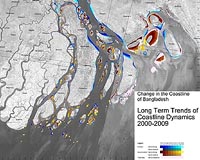| . |  |
. |
Sydney (AFP) April 11, 2010 A stricken Chinese ship that leaked oil onto the Great Barrier Reef is a loud wake-up call about the environmental risks of Australia's booming trade with its Asian neighbours, conservationists say. The coal vessel ran aground amid a massive increase in the number of multi-billion dollar coal and gas deals between Australian companies and Asian energy firms that are underpinning the country's economic growth. Conservationists say because much of the coal and gas will be taken from or shipped through pristine landscapes, such as the Great Barrier Reef, the giant, stranded Shen Neng 1 is a sign of things to come. "The current lack of safeguards around shipping in the Great Barrier Reef is akin to playing Russian roulette with one of the world's most treasured natural icons," WWF-Australia conservation director Gilly Llewellyn said. "We're only going to see an escalation of large vessels... transiting up inside the Great Barrier Reef. So as the frequency of vessel numbers increases, then you will also see an escalation of the risk of a major environmental catastrophe." Police have also arrested three men over another bulk carrier that illegally entered the reef's marine park, following allegations that ships were using one of the world's great ecological treasures as a short-cut. Llewellyn said the Shen Neng 1, which veered off an authorised route after leaving Gladstone port for China carrying 68,000 tonnes of coal and nearly 1,000 tonnes of heavy fuel oil, had been "bouncing around like a jackhammer on the reef". "I think it is a wake-up call that as we look at some of these massive developments, that we equally need to step back and have a close strategic look at all aspects of environmental risks," Llewellyn told AFP. Although a major disaster appears to have been averted -- chemical dispersants have cleaned up the initial spill, and workers are pumping fuel from the vessel -- fears remain that the ship could break up or leak more oil. It is also the third major accident to affect Australia in just over a year. In March 2009, containers that fell off a cargo ship during a cyclone punctured the vessel and caused a 270,000 litre (70,000 gallon) oil spill on the beaches of the northeastern state of Queensland. In August, the Montara oil well platform off Western Australia caught fire and dumped up to 28,000 barrels of oil into the Timor Sea in what has been termed one of the nation's worst environmental disasters. "This coal carrier running aground highlights the risks associated with shipping. What Montara has underscored is the risks associated with the exploration and production side of oil and gas," Llewellyn said. The Australian Conservation Foundation said the clash between environmental and commercial interests will intensify as companies and governments rush to take advantage of strong Asian demand for natural resources. "These are industries that claim to be benign on the marine environment but they are certainly having a big impact," campaigner Chris Smyth said. Smyth said export ships should use alternative routes that avoid the world heritage-listed coral reef, which stretches for some 3,000 kilometres (1,860 miles) along Australia's northeast coast. Penalties for accidents like the Shen Neng 1's can extend to fines of 5.5 million dollars (5.1 million US) and jail terms of up to three years, while officials are also discussing placing Australian pilots on ships. Greg Webb, senior lecturer at Queensland University of Technology, said environmental safeguards were often seen as a luxury when it came to business. But he said the port of Gladstone -- likely to be the export centre for Queensland's burgeoning coal seam gas sector -- was used successfully by thousands of ships each year. "This is as good a navigable shipping channel as anybody has -- it's just that it does go through this terribly sensitive area that we have to protect," he said. "This is very much an unusual event, thankfully. But I think it does have to serve as a warning for us, that even under the best laid plans accidents happen. We have to be prepared for them."
Share This Article With Planet Earth
Related Links Water News - Science, Technology and Politics
 Bangladesh claims disputed vanishing island
Bangladesh claims disputed vanishing islandDhaka (AFP) April 10, 2010 Bangladesh claimed sovereignty Saturday over a tiny island at the centre of a dispute between Dhaka and New Delhi, despite claims by Indian researchers that it has disappeared under rising sea levels. The uninhabited outcrop - called New Moore island by India and South Talpatti by Bangladesh-- was 3.5 kilometres (about two miles) long and 3.0 kilometres wide before it was swallowed up by th ... read more |
|
| The content herein, unless otherwise known to be public domain, are Copyright 1995-2010 - SpaceDaily. AFP and UPI Wire Stories are copyright Agence France-Presse and United Press International. ESA Portal Reports are copyright European Space Agency. All NASA sourced material is public domain. Additional copyrights may apply in whole or part to other bona fide parties. Advertising does not imply endorsement,agreement or approval of any opinions, statements or information provided by SpaceDaily on any Web page published or hosted by SpaceDaily. Privacy Statement |